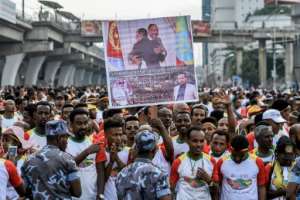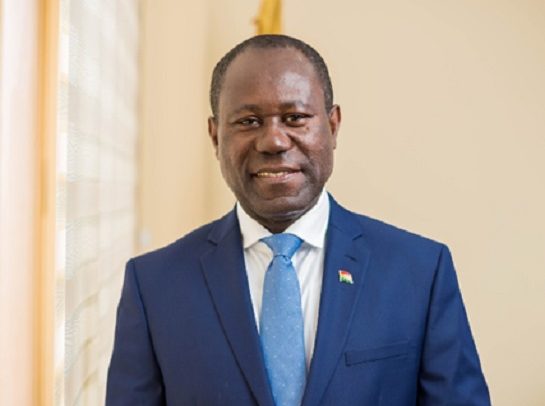
The lifting of UN sanctions on Eritrea is an unconditional win for the Red Sea state but no guarantee of change to domestic policies that have led to isolation and a refugee crisis.
The UN on Wednesday lifted an arms embargo as well as travel bans, asset freezes and targeted sanctions imposed nine years ago to punish Eritrea for its alleged support to jihadists in Somalia, an accusation Asmara has always dismissed.
But analysts warn against expecting any major changes in Eritrea, despite the rapid reshaping of relations in the Horn of Africa since Ethiopia moved to break a hostile years-long impasse this summer.
"The expectation at all levels of Eritrean society is that now there's going to be some sea change, and so far, there's no sign of it," said Matt Bryden, director of Nairobi-based think tank Sahan and a former coordinator of the UN group monitoring the sanctions.
Eritrea plunged into repression and isolationism following a 1998-2000 border war with its much larger neighbour Ethiopia.
With the two nations locked in a standoff over disputed territory, Eritrea's authoritarian regime jailed dissident politicians and independent journalists, and forced much of the population into perpetual national service.
The repression prompted the flight of hundreds of thousands of Eritreans, many of whom made the risky journey to Europe in search of asylum and a better life.
Eritrean vindication
With neither a constitution nor parliament, the power to change Eritrea is entirely in the hands of President Isaias Afwerki, a pugnacious former guerrilla fighter.
But both peace with Ethiopia -- which followed Prime Minister Abiy Ahmed's promise to cede disputed land to Asmara -- and the lifting of UN sanctions play into Isaias' hands.
"There will be a lot of vindication rhetoric, that we were right all along," predicted Awet Tewelde Weldemichael, an associate professor at Queen's University in Canada.
"But in practical terms, I don't see much changing."
To weaken Ethiopia, Eritrea trained armed groups fighting Ethiopia's 2006 invasion of Somalia. Some of those fighters morphed into the Shabaab Islamist insurgency that plagues the country to this day, according to Bryden.
 Thousands of Eritreans and Ethiopians took part in a 10-kilometre reconciliation run in Addis Ababa on Sunday to celebrate the diplomatic thaw between the two nations. By Michael TEWELDE (AFP)
Thousands of Eritreans and Ethiopians took part in a 10-kilometre reconciliation run in Addis Ababa on Sunday to celebrate the diplomatic thaw between the two nations. By Michael TEWELDE (AFP) The support to militants in Somalia, as well as an unwillingness to resolve another sometimes-violent border dispute with Djibouti, prompted the UN to impose sanctions.
"Asmara's refusal to even talk about it, let alone make tangible progress on resolving [the dispute with Djibouti], were the main argument" for the sanctions, said Dan Connell, a researcher on Eritrea at Boston University.
Eritrea is among the world's poorest countries and Asmara blamed sanctions for hindering development, but Awet, who fled the country as a refugee, dismissed this narrative.
"The sanctions did not cause any of the hardships that Eritrea is gripped by," he said.
Little push for change
Despite all the talk of peace and a new dispensation in the Horn of Africa triggered by Abiy's sweeping reforms, Eritrea has yet to make any changes: dissidents still languish in jail, young men and women are still forced into national service.
Instead, critics -- including a former finance minister -- are still being arrested and Eritreans are still fleeing, with the UN saying more than 14,000 have left since the border with Ethiopia was reopened in September.
Bryden expects Isaias' administration to once again face pressure to change tack, but this time it might come from Eritrea's business, political and military elites who sense an opportunity for Eritrea to re-engage with the world.
But, he warned, "Eritrea hasn't had normal governance for 20 years, and it's not clear that the competence and expertise required to make these changes still exists."
On the world stage, Eritrea is set to benefit from sanctions relief irrespective of its domestic policies.
"Keeping sanctions in place was not in the US' interest," Connell said, adding that Eritrea's recent promise to end the border dispute with Djibouti made it "a done deal".
"The goal in Washington now is reintegrating Eritrea into the region, restructuring a bilateral relationship and establishing a regional bulwark against Islamic extremism," he added.
Positioned on the Red Sea's western shore, the United Arab Emirates already has a military base in Eritrea and Awet said the country's geopolitical value means the US and Europe will want to make an ally of Isaias, whether or not there's change at home.
"What's the point of having Eritrea on your side if you can't put it to its maximum use as a strategic asset?" he asked.
Read Full Story





















Facebook
Twitter
Pinterest
Instagram
Google+
YouTube
LinkedIn
RSS